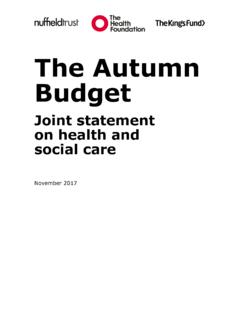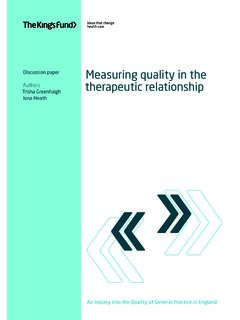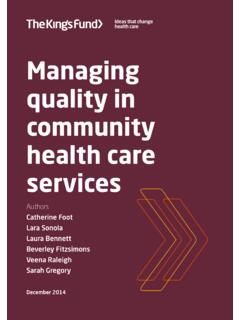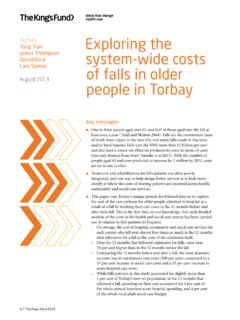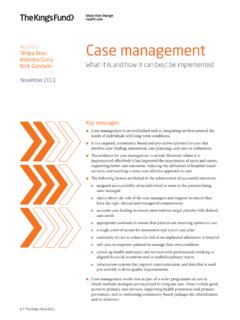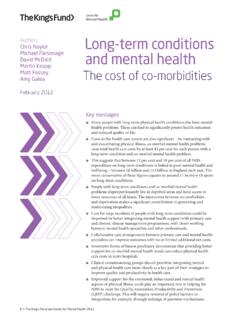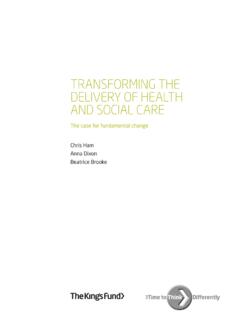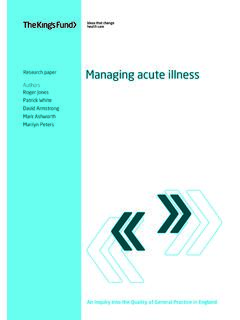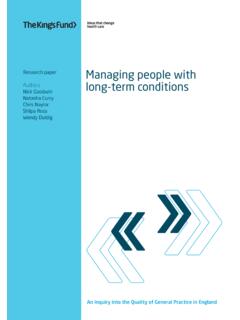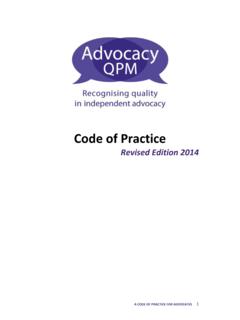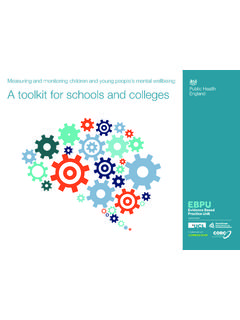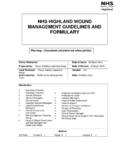Transcription of MAKING SHARED DECISION-MAKING A REALITY
1 MAKING SHARED . DECISION-MAKING A REALITY . No decision about me, without me Angela Coulter, Alf Collins The King's Fund seeks to Published by understand how the health The King's Fund system in England can be 11 13 Cavendish Square improved. Using that insight, we London W1G 0AN. Tel: 020 7307 2568. help to shape policy, transform Fax: 020 7307 2801. services and bring about behaviour change. Our work includes research, analysis, The King's Fund 2011. leadership development and service improvement. We also First published 2011 by The King's Fund offer a wide range of resources Charity registration number: 1126980. to help everyone working in health to share knowledge, All rights reserved, including the right of reproduction in whole learning and ideas. or in part in any form ISBN: 978 1 85717 624 7.
2 A catalogue record for this publication is available from the British Library Available from: The King's Fund 11 13 Cavendish Square London W1G 0AN. Tel: 020 7307 2568. Fax: 020 7307 2801. Email: Edited by Edwina Rowling Typeset by Soapbox, Printed in the UK by The King's Fund Contents About the authors v Acknowledgements vi Summary vii Why SHARED DECISION-MAKING is important vii What SHARED DECISION-MAKING involves vii What are the implications for patients, clinicians and the NHS? viii Introduction 1. What is SHARED DECISION-MAKING ? 2. Two sources of expertise 2. Decision aids 4. Decision support and health coaching 7. Recording and implementing decisions 8. SHARED DECISION-MAKING and commissioning 9. When is SHARED DECISION-MAKING appropriate? 11. An ethical imperative 11. Decision points 13. Applying SHARED DECISION-MAKING in different clinical settings 14.
3 What does SHARED DECISION-MAKING look like? 25. Consulting style 25. Working with patients who have low confidence to engage 31. Why is SHARED DECISION-MAKING not yet the norm? 32. Patchy implementation 33. Patients want involvement 33. People from disadvantaged groups have most to gain 34. Informed and involved patients demand less, not more 34. MAKING time to do it 35. SHARED DECISION-MAKING is effective 35. Incentives to improve clinical DECISION-MAKING 36. Conclusion 39. References 40. The King's Fund 2011. The King's Fund 2011. About the authors Angela Coulter is Director of Global Initiatives at the Foundation for Informed Medical DECISION-MAKING , Boston, and Senior Research Scientist in the Department of Public Health, University of Oxford. Alf Collins is National Clinical Lead of the Health Foundation's Co-creating Health Programme and Clinical Lead of the Somerset Community Pain Management Service, hosted by Taunton and Somerset NHS Foundation Trust.
4 The King's Fund 2011 v Acknowledgements The authors are very grateful to Anna Dixon, Sue Roberts, Nigel Mathers, Natalie Grazin and the anonymous reviewers for their comments and suggestions in response to earlier drafts of this report. vi The King's Fund 2011. Summary SHARED DECISION-MAKING is a process in which clinicians and patients work together to select tests, treatments, management or support packages, based on clinical evidence and the patient's informed preferences. It involves the provision of evidence-based information about options, outcomes and uncertainties, together with decision support counselling and a system for recording and implementing patients' informed preferences. The government wants SHARED DECISION-MAKING to become the norm in the NHS, but there is confusion about why it is important, what it involves and what the implications might be for patients, clinicians and the wider health service.
5 This report clarifies the concept and outlines the actions needed to make the aspiration a REALITY . Why SHARED DECISION-MAKING is important SHARED DECISION-MAKING is viewed as an ethical imperative by the professional regulatory bodies which expect clinicians to work in partnership with patients, informing and involving them whenever possible. It is important for patients because they want to be more involved than they currently are in MAKING decisions about their own health and health care. There is also compelling evidence that patients who are active participants in managing their health and health care have better outcomes than patients who are passive recipients of care. SHARED DECISION-MAKING is also important for commissioners because it reduces unwarranted variation in clinical practice. SHARED DECISION-MAKING is the princ ipal mechanism for ensuring that patients get the care they need and no less, the care they want, and no more' (Al Mulley, personal communication).
6 And is the essential underpinning for truly patient-centred care delivery. What SHARED DECISION-MAKING involves There is some confusion about the relationship between SHARED DECISION-MAKING , self-management support and personalised care planning. We argue that they are similar philosophies, each requiring that clinicians recognise and respect the patient's role in managing their own health. They also require advanced communication skills and the use of a number of tools and techniques to support information-sharing, risk communication and deliberation about options. The King's Fund 2011 vii MAKING SHARED DECISION-MAKING a REALITY SHARED DECISION-MAKING is appropriate for decisions about whether to: undergo a screening or diagnostic test undergo a medical or surgical procedure participate in a self-management education programme or psychological intervention take medication attempt a lifestyle change.
7 What are the implications for patients, clinicians and the NHS? The key message is that we could, and need to, do better. Effective SHARED DECISION-MAKING is not yet the norm and many patients want more information and involvement in decisions about treatment, care or support than they currently experience. Embedding SHARED DECISION-MAKING into systems, processes and workforce attitudes, skills and behaviours is a challenge. Several pilot implementation projects are under way and they will offer valuable experience for practice in the future. We make a number of suggestions about what needs to happen to make SHARED DECISION-MAKING a meaningful REALITY . These include: greater national provision of decision aids and the development of common and consistent approaches the identification of decision points in care pathways and the monitoring of the quality of SHARED DECISION-MAKING better provision, recording of, and support for, SHARED DECISION-MAKING by providers inclusion of the subject in training; appropriate incentivisation the inclusion of SHARED DECISION-MAKING in commissioning standards and contracts.
8 Viii The King's Fund 2011. Introduction The government wants to place patients' needs, wishes and preferences at the heart of clinical DECISION-MAKING by MAKING SHARED DECISION-MAKING the norm throughout the NHS. The Secretary of State for Health, Andrew Lansley, has articulated this vision in the phrase nothing about me, without me'. But as yet there has been little guidance on what this means for clinicians, patients, provider organisations or commissioners, or on how the government intends to support its implementation nationally. This report aims to fill that gap by clarifying what SHARED DECISION-MAKING is and why it is not yet widely practised, and suggesting what needs to be done to make the aspiration a REALITY . This report is concerned with SHARED DECISION-MAKING in the context of the decisions made between individual patients and individual clinicians.
9 We are not concerned here with the wider aspects of public involvement; the focus is on patients' engagement in their own health and health care. We have written this paper with a broad readership in mind, including policy- makers, health care leaders, patient and consumer groups. Each group has an important role to play in supporting the implementation of SHARED decision- MAKING . We also hope that the paper will be of interest to clinicians, both as commissioners and as providers of health care. Ultimately it is clinicians who need to deliver the vision of SHARED DECISION-MAKING it is only they who can choose whether or not to share decisions with patients. The King's Fund 2011 1. What is SHARED DECISION-MAKING ? SHARED DECISION-MAKING is a process in which clinicians and patients work together to clarify treatment, management or self-management support goals, sharing information about options and preferred outcomes with the aim of reaching mutual agreement on the best course of action.
10 Much of the research evidence about SHARED DECISION-MAKING has focused on: major health care decisions where there is more than one feasible option screening tests and preventive strategies self-management support for people with long-term conditions. However, we think that most consultations between clinicians and patients should evoke the spirit of SHARED DECISION-MAKING . We explain this in more detail below. SHARED DECISION-MAKING explicitly recognises a patient's right to make decisions about their care, ensuring they are fully informed about the options they face. This involves providing them with reliable evidence-based information on the likely benefits and harms of interventions or actions, including any uncertainties and risks, eliciting their preferences and supporting implementation. There are three essential components: provision of reliable, balanced, evidence-based information outlining treatment, care or support options, outcomes and uncertainties decision support counselling with a clinician or health coach to clarify options and preferences a system for recording, communicating and implementing the patient's preferences.
